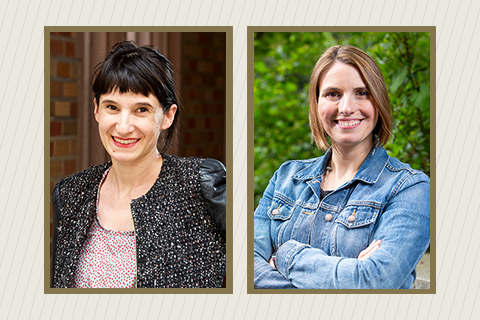Leah Pistorius
October 6, 2022
Human Centered Design & Engineering Professors Daniela Rosner and Julie Kientz have received a new grant from the National Science Foundation to explore the future of equitable childcare worker technologies.

Daniela Rosner, HCDE associate professor (left); Julie Kientz, HCDE professor and department chair (right)
The three year, $1.8 million award is part of an investment by the National Science Foundation in research projects designed to increase opportunities for US workers and generate positive societal and economic impacts at the local and national level.
Collaborating with Rosner and Kientz include University of Washington professors Franziska Roesner, associate professor in the Paul G. Allen School of Computer Science & Engineering; Audrey Desjardins, associate professor of interaction design in the School of Art + Art History + Design; and Rachel Fyall, associate professor in the Evans School of Public Policy & Governance.
The Future of Equitable Childcare Worker Technologies
Project abstract:
In-home childcare work is critical to society; millions of parents rely on childcare workers who either come to parents' homes, or who provide childcare service in their own homes. However, childcare workers face a number of challenges such as unsafe working environments and unclear expectations, poor access to training and social support, and low wages with minimal paid time off. These challenges may be exacerbated by technologies increasing used for in-home childcare, including cameras and other smart home technologies, and platforms that match workers and families (often for short-term "gig" employment). This project's goal is to better understand the risks and opportunities these technologies pose and to design new technologies that benefit childcare workers and services, parents and children, and society as a whole. The team will develop better understanding of risks posed by technologies currently used for in-home childcare: for instance, how existing hiring platforms and parents' decisions affect and perhaps bias hiring decisions, or how smart home technology may affect workers' privacy and autonomy. The team will also explore technologies that make better matches between workers and families, as well as technologies that improve in-home childcare workers' training and support networks. As a whole, this project works toward a future in which childcare work technology is consensually used and mutually beneficial for employees, children, and childcare workers.
The research is rooted in approaches to childcare work technology that prioritize safety, sustainability, and empowerment among workers and employees. To that end, the project's starts with sustained empirical research with childcare workers, families, childcare placement services, and companies that support individual workers' business needs. Through forums and directed research groups, the team will build a comprehensive understanding of the existing childcare ecosystem and sustained, supportive partnerships with these stakeholders. These findings and partnerships will undergird the phase, which focuses on the design and evaluation of new technologies to support stakeholders' needs. The team envisions technical advances that improve hiring, training, and working conditions. For hiring, the goal is to design platforms and algorithms that match workers with families to meet both parties' needs while avoiding risks around bias that hiring algorithms sometimes raise. For training, the team envisions using virtual reality and virtual agents to help workers prepare for difficult or rare childcare situations and conversations with other stakeholders. For working conditions, the goal is to develop systems that help workers connect with other workers for emotional support and well-being, informational support around both the work itself and the management of the worker's business, and organizational support toward empowering workers to improve their working conditions. The technology work will take a research through design approach in which both iterative design approaches and the evaluation will contribute to a more formal understanding of the landscape of technologies to support childcare work.